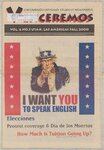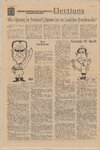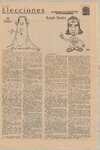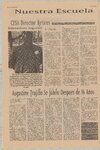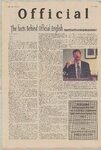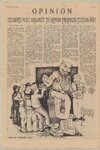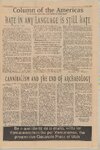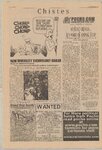| OCR Text |
Show Official 10 VENCEREMOS The facts Behind Official English by Maria Jaramillo “Ingles?” SRA Cre. “Jackson?” AELere. “J-A-R-A-M-I-L-L-O?” - Sinking back into the corner, 1 cringed every morning when the roll was taken in class. Suffering from extreme shyness, the snickers that accompanied my name being spelled out stopped me from even stammering out an answer. I didn't need to respond. Since the first day the teacher knew who I was, and where 1 sat in class. This was a daily torture that started on that first day of my seventh grade art class whenI insisted he her- itage, but with the exception of my grandmother, I grew up rarely hearing Spanish. With my fair skin and lacking an accent, it isn't easy to convince people Tm Latina. There is only one thing that is the tell -tell sign of my descent, which would distinguish me from a Remale Caucasian. The correct pronunciation of my name. E ta I was the only “Maria” I knew growing up. I E get with the remember the odd glances I woul strange way Í pronounced the “R,s” and being corrected that “J,s” do not sound the same as “H.” Wellmeaning teachers tryed to correct the way ÍI said my name. Those well-meaning teachers didn't realize that their corrections were taking me further away from my culture and self-identity. For years I have spoken English “correctly,” but at what cost? With the exception of my family, I don't pronounce the roll in the “R” sound in either my first or last name. What was lost when the traces of my heritage learned what it meant to be American? A-mer-i-can, Á native or inhabitant of America esp. a citizen of the U.S. fund and into other programs offered by the state. A question for Utah voters might be, comparatively speaking, should taxpayer money be spent in printing .06 percent of its official documents in foreign languages or in costly lawsuits? Utah Common Voices, an organization against the English-Only initiative, explains that “Utah taxpayers can expect to spend millions defending this poorly written and potentially unconstitutional law.” Another way to appeal to voters is by stating that this law will preserve the common language. Their mission statement refers to preserving the English language. Referring to a preservation of English can imply e English is in some way endangered. a Historically speaking, the fear of obliteration of a language can be well supported by using the loss of many Native American languages due to the immigration of Englishspeakers. This logic should also take into consideration that English has become such a common second language worldwide, even now proposed the official second language of Thailand. It is considered a tool to a worldwide economy. English is spreading faster than ever before and is ave but under attack by foreign tongues. Utahns might get the impression that English is not being acquired at a rate that is beneficial to immigrants, and that the initiative will encourage immigrants to assimilate faster into Utah society. This impression might be understood by looking at the” waves of immigrants that Utalns areg encountering on a scale larger than ever grams but also does not create any new programs? Utah Governor Mike Leavitt stated in a monthly KUED press conference that, “It is not necessary to pass a law to make English our official language.” Utah Common Voices goes further to explain that “passing the nation's most restrictive Official English law will create an environment of hostility and division in our communities. We don't want a hostile environment for Utah schoolchildren, during the Olympics, in business and trade or in our communitieso. A law that amends Utah's state constitution that in photos by past years. The Latina/o, Asian and Pacific Islander communities are expanding and multilingualism is no longer a novelty but a necessity in the competitive workplace. he proponents of the initiative are claimNew Webster's Dictionary of the English Language Tammy Rowanlr ing that in order to create the incentive for en Ferrin(above) debated defines what an American is in about twelve words. A che minority communities to leave “lan- over Initiative A, English as the Official Language, at native or inhabitant, there is no mention of the ability guage enclaves” and assimilate into the the Hinkley Institute of Politics on the University of to speak the English language with proficiency. mainstream populace, English proficiency Is language the common bond that unites Ámerica, or is it merely a side effect when groups of people must be a necessity. Creating clk cial docu- Utah Campus. Ferrin opposes the Initiative, Rowan ments available in English only, proponents come together to create a strong society? : to partici- wrote the first legislative bill in favor of English-Only Initiative A on the November ballot claims to argue, will encourage minorities pate more fully in the pre-dominant landefine Americanism for non-English-proficient speakhas been voted down every time it has gone in front of guage of society. | _. E ers. It is worded as “ENGLISH AS THE OFFICIAL the State legislature is now left up to Utah voters. Language enclaves are inner communities where LANGUAGE OF UTAH.” This movement has This is a decision that will affect not only Utah immigrants, can work, live and socialize all in the helped to bring out the cultural awareness that Eng: minority communities but also the message Utah lish is not the official language, but now there are communities, native tongue... What might not be clearly understood by Utah vot- wants to send to the world that it has invited here in questions as to why there are voters who feel there is a A , ers is the transition period of immigrants, and the 2002. sudden need for it to be. role that language enclaves play in the assimilation of - We can only hope it's the right message. “ Lacking a history of language politics-that is a history in which language predominated as a symbol, “immigrants into mainstream Utah. As remembered by University of Utah student, weapon, and stake of ethnic conflict- Utah does not Santi Soumpholphakdy, who was brought with his have a well-established idea of what implications this family to Utah seeking political sanctuary from Thai- initiative has for limited-English proficient speakers. land; The pros and cons of this type of initiative can only be “It was hard coming here and not knowing English. understood by looking at both arguments for and I learned most of my English from television but didagainst the initiative and the consequences of similar n't talk to anybody bite my sponsor family in English. English-Only laws passed by other states. It wasn't until college that Í felt comfortable enough Initiative A has been proposed for three years and to talk and communicate in English.” : consecutively voted down in the Utah State Legisla- Bu | E A | ANA | ¡ a Ll | LATA A hn say my last name correctly. 1 come from Latina AL a FALUDOOO ture. While this is not a Utah-born initiative, 1t was put on the ballot by petitions circulated statewide by U.S. English, a Washington D.C. based corporation. U.S. English Inc. is the main advocator of this im1tiative, issuing forth pamphlets color-coded red, white and blue stating that their mission is to “preserve our common bond by making English the official language of government in the United States and by promoting opportunities for people living here to learn English.” All official documents, transactions, e meetings or publications conducted on behalf of the state will be in English. According to a 1995 General Accounting Office report, 99.94 percent of all federal government documents are in English. A margin of .06 percent is what this initiative is fighting. There are different avenues that U.S. o Inc. is using to appeal to voters. One of the first claims made is that this initiative will save taxpayer money. Advocating this initiative is Rep. Tammy Rowan R-Utah stating that taxpayer money is spent printing official documents in languages other than English. This initiative will return the money to the general If the argument for the initiative is that it creates incentives for immigrants to learn English, a perception is created that immigrants are not acquiring English proficiency, or moreover, resisting the acquisition of English. If this view is accepted, and the intention of Utah voters is to help create more avenues for immigrants, by adopting this initiative, their efforts will be well intended but misguided and harmful to already-existing programs. Lorna Vogt, director of Utah Progressive Network, explains; i “This initiative sends a message of intolerance toward speakers with limited English proficiency. The “initiative does not create more o to encourage English proficiency, but it does take the money away from already existing programs and puts it back into a a fund...where it is not guaranteed to return ack. There are over twelve different languages that are found in English-as-a-Second-Language (ESL) classes. The ESL classes are filled with growing waiting lists. Should Utah voters pass an amendment that not only takes funding away from the already existing pro- |
